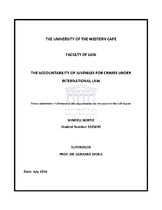The accountability of juveniles for crimes under international law
Abstract
Children have been committing crimes during times of war and other armed conflicts since time immemorial. Yet, it is only over the last few decades that cognisance is being taken of child soldiers as a type of juvenile. The unfortunate sight of a child holding a gun has become a familiar picture throughout armed conflicts, especially in Africa. Both boys and girls are used as child soldiers and they can be as young as 5 years old. They are mainly regarded as victims of crimes under international law and are therefore usually rehabilitated once they have been disarmed and demobilised. Notwithstanding their need for rehabilitation, it is a fact that child soldiers commit some of the most egregious crimes under international law. They receive military-style training and are presumably not afraid of killing and carrying out orders. Yet it is recognised that generally they do not have the same level of maturity as adults. The reality of child soldiers who join armed forces therefore presents complex legal questions in the face of contemporary international criminal law principles which, on the one hand, afford protection to all children, and on the other, unequivocally call for the prosecution and punishment of those who are individually responsible for committing crimes under international law. Consequently, various safeguards need to be upheld to ensure that the best interests of the child are maintained once a child soldier is held criminally responsible. This thesis analyses the extent to which child soldiers can be prosecuted under domestic and international law, as well as the implementation of alternative measures to prosecution. The thesis proposes that a case-by-case approach should be considered when child soldiers are prosecuted for crimes under international law, thereby investigating and analysing the often distinctive circumstances related to their crimes.

